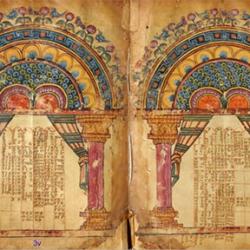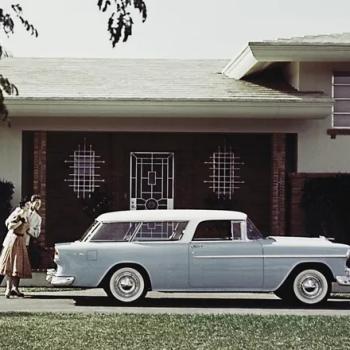Books & Culture recently hosted a symposium on the “historical [or not] Adam,” organized by Karl Giberson and John Wilson. Eight participants posted brief essays on the subject, followed by a round of responses. Here are some highlights from each:
Peter Enns, Eastern University: “the modern study of the ancient world of the Bible has made a ‘historical Adam’ intellectually implausible. Since the 19th century, through scads of archaeological discoveries from the ancient world of the Bible, biblical scholars have gotten a good handle on what ancient creation stories were designed to do. Ancient peoples assumed that somewhere in the distant past, near the beginning of time, the gods made the first humans from scratch—an understandable conclusion. They wrote stories about “the beginning,” but not to lecture their people on the abstract question “Where do humans come from?” They were storytellers, drawing on cultural traditions, writing about the religious—and often political—beliefs of the people of their own time … Evangelicals tend to focus on protecting the Bible against the attacks of evolution. The real challenge before them is to reorient their expectation of what the story of Adam and Eve is actually prepared to deliver.”
Karl Giberson, Stonehill College: “Most arguments for the historicity of Adam are little more than wishful thinking… For centuries we understood ourselves as fallen, sinful creatures—an understanding that served as a caution by illuminating our dark behaviors. We still find ourselves in need of salvation, however, and yet strangely lost in our search for solutions. The original sinner has indeed gone extinct, but he didn’t take original sin with him.”
Denis Lamoureux, St. Joseph’s College: “I view Adam as an incidental ancient vessel that delivers inerrant spiritual truths regarding men and women. Genesis 2 reveals that the Lord God created us; we are not a mistake or fluke of nature. This chapter also discloses that our Creator sets boundaries for us and that we are accountable before him. Breaking God’s commandments leads to divine judgment and we will face the consequences for transgressing his word.”
Hans Madueme, Covenant College: “If scientific plausibility should guide the expectations we bring to Scripture, then why would we be Christians? Why would we believe that the Son of God became a man? That he died and rose again after three days? That he ascended into heaven? These fundamental Christian beliefs contradict everything we know from mainstream science. If we can no longer believe Adam was historical, then why should we believe in the resurrection? …Or, to flip the script, if we believe the resurrection, then a historical Adam is no biggie.”
Harry “Hal” Lee Poe, Union University: “Under an evolutionary model, we may say that we have common ancestors who lived 40,000 years ago, 400,000 years ago and 4,000,000 years ago. What that model cannot tell us is when our ancestors became humans. … If Paul’s teachings are false, then the Bible is not true and has no authority. This Enlightenment trail of logical dominoes now affirms a non-biblical basis for biblical authority. The biblical basis for biblical authority declared by God to Moses and affirmed throughout the New Testament is that the Scriptures have been fulfilled.”
John Schneider, Grand Valley State University: “sincere Christians are fighting to the death to make embarrassing falsehoods fundamental to Christian faith! What could be better for atheists, or worse for the Christian cause? The irony is that it is that literal Adam and Eve are discrediting the Bible and causing faith to be undermined. It is time for Christian leaders to take a breath, to stop this misguided, self-destructive—and faith-destructive—behavior, and to listen to the wisest and best scholars in their midst (the ones they haven’t fired yet, or driven off!).”
William VanDoodewaard, Puritan Reformed Theological Seminary: “For millennia, the mainstream of the church has understood this: Genesis reveals an awe-inspiring mystery. All creation—from matter and time, light and darkness, stars and kinds (not equated with modern species) of creature and plant—was created distinct, mature, and productive, with order and inter-relationship, in one week prefaced by nothing but God’s existence. The Trinity acted in a sudden, cosmic event revealing his wisdom, power, and delight. In this context, God formed the image-bearer, Adam, whose humanity Christ would in time take to himself. Shaping Adam from the dust of the earth, God breathed into him the breath of life, so that he became a living being. Eve was likewise intimately created, that same day, from Adam’s rib. The divine work of the creation week culminated in this mature, sin-free couple, created to enjoy communion with God, happiness of the proto-typical marriage, be fruitful, multiply, and rejoice in a splendid creation. Here is the beginning of humanity, the beginning of our history.”
John H. Walton, Wheaton College: “We can contend that Adam and Eve are theologically and historically significant even if they were not the first humans. We can contend that Adam and Eve are appropriately positioned as fountainheads of humanity even if we are not all their direct biological descendants. We can contend that humanity has a distinct place in the created order, unique among species, even if Adam and Eve are not de novo creations.”
Next week, I’ll discuss the second round of the symposium and offer some analysis.















